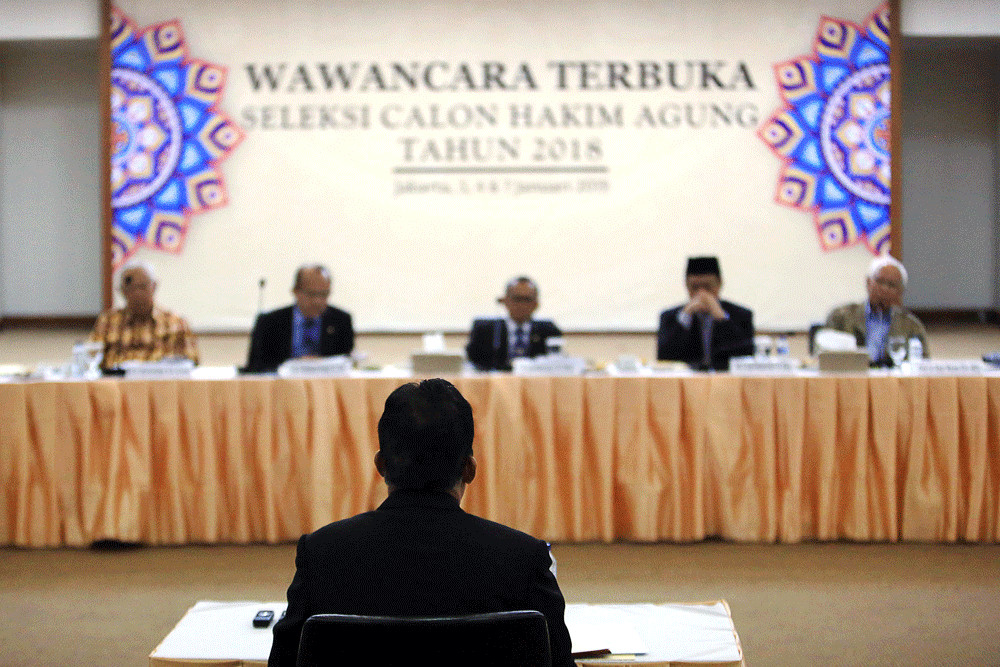Popular Reads
Top Results
Can't find what you're looking for?
View all search resultsPopular Reads
Top Results
Can't find what you're looking for?
View all search resultsSupreme Court snubs most Judicial Commission’s recommendations
Change text size
Gift Premium Articles
to Anyone
 Are you next?: Candidate Ridwan Masyur answers questions asked by a selection panel during the open interview phase of the 2019 Selection of Justices at the Judicial Commission auditorium in Jakarta on Thursday. Twelve justice candidates were interviewed in the final stage of the selection process. The selection panel comprised retired justices, statespersons and scholars. (The Jakarta Post/Seto Wardhana)
Are you next?: Candidate Ridwan Masyur answers questions asked by a selection panel during the open interview phase of the 2019 Selection of Justices at the Judicial Commission auditorium in Jakarta on Thursday. Twelve justice candidates were interviewed in the final stage of the selection process. The selection panel comprised retired justices, statespersons and scholars. (The Jakarta Post/Seto Wardhana)
E
ven as the judicial reform process goes on, the Supreme Court continues to turn a cold shoulder to the body formed to oversee it, ignoring nearly half of the Judicial Commission’s (KY) recommendations in 2018.
The KY was set up in 2005, a few years after the People’s Consultative Assembly passed a constitutional amendment mandating the establishment of a body to oversee the judiciary. After the fall of the New Order regime, there was pressure to institute strong controls over what was seen as a corrupt judicial system.
The commission has often clashed with the Supreme Court and has had its authority curtailed over the years. It currently only has the power to appoint Supreme Court justices and investigate ethical breaches by judges and recommend sanctions for judges found to be in violation of rules.
In 2018, the KY recommended sanctions against 63 judges who were found to have violated the judges’ code of ethics, with punishments ranging from verbal reprimanding to dismissal from the bench.
Around a third of the sanctions were for “unprofessional conduct”, while six were for adultery, five for typing errors and eight for behavior that “did not protect the dignity of judges”.
The Supreme Court has responded to only about half of those recommendations, punishing three judges and saying that it would follow up on seven others, while claiming it could not follow up on punishment recommendations for 21 judges. The commission has yet to receive a response on 27 of the sanction recommendations it submitted to the court.
“The Supreme Court often does not implement the sanctions recommended by the KY,” KY chairman Jaja Ahmad Jayus said in a statement recently.
He added that the Court often did not give the commission access to the information it needed to investigate reports it received from the public.
Throughout 2018, the commission received 1,719 public reports, the majority of which were for civil cases at district courts. Most of the reports came from Jakarta (311 reports), East Java ( 212 ), North Sumatra ( 162 ), West Java ( 120 ) and Central Java ( 120 ).
Out of the 1,719 reports, 412 were found to fulfill the requirements to be registered with the commission, which has ruled on 290 of them.
“Many of the reported judges as well as witnesses from the judiciary have not responded to KY summons,” Jaja said.
In an effort to improve its authority, the commission has urged the House of Representatives to pass a bill on the tenor of judges that it has been deliberating since 2015.
The bill, among other things, introduces the concept of shared responsibility, which would give the commission more involvement in the recruitment, promotion, and monitoring of lower court judges.
The bill would also empower the commission to directly sanction judges it finds guilty of violations, instead of merely issuing recommendations to the Supreme Court.
“The KY strongly supports the passing of the judge tenure bill, so that the process of recruitment, rotation and movement of judges and KY’s role in overseeing the process is clearer,” Jaja said.
Dio Ashar Wicaksana of the University of Indonesia’s Indonesian Judicial Watch Society (MAPPI), however, said the commission should not pin all its hopes on the bill but try to work better within the existing system.
“While it may be true that the bill would help the KY carry out its duties, there is no telling when the bill will be passed,” he told The Jakarta Post. “The Civil Code and Criminal Code revision bills have still not been passed yet, and lawmakers will be busy with campaigning for the 2019 general elections.”
Dio said the KY should focus on working with the Supreme Court to delineate its authority and prevent further clashes.
“The Supreme Court often accuses the KY of wading into technical judicial matters, while the KY claims it is merely looking into ethics violations,” he said. “The two institutions should try and resolve this, perhaps by inviting a neutral third party to make suggestions.”
Dio added that there should be a liaison office between the two institutions, especially for sanction recommendations.
“This way, they would hopefully communicate better,” he said.
This article was originally published in The Jakarta Post's print edition on Jan. 4, 2019, with the title "Supreme Court snubs most KY recommendations".










